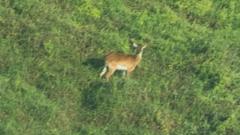Slovakia's government has approved the sale of brown bear meat following plans to cull around a quarter of the country's bear population in response to increasing human encounters. Despite opposition from conservationists and criticism regarding the treatment of protected species, officials emphasize the need to reduce waste and address safety concerns.
Slovakia Moves Forward with Controversial Plan to Sell Brown Bear Meat

Slovakia Moves Forward with Controversial Plan to Sell Brown Bear Meat
After the approval of culling brown bears, Slovakia's government aims to sell the meat to the public, sparking debate over conservation and public safety.
Slovakia's government has initiated a contentious strategy permitting the sale of brown bear meat to the public, generating significant backlash within conservation circles and from opposition leaders. The decision follows a cabinet directive last month authorizing the kill of approximately 350 of the country’s 1,300 bears due to a spate of dangerous human-bear encounters.
Critics argue that this plan compromises wildlife conservation principles upheld by the EU, under which brown bears are classified as a "near threatened" species by the World Conservation Union. Opposition figures in Slovakia and the European Parliament have condemned the government's approach as excessively punitive towards wildlife, advocating instead for preventive measures to mitigate human-bear interactions.
State Minister Filip Kuffa justified the sale, citing the ethical imperative to utilize the bear meat, which would otherwise end up in waste management. He assured that any bear meat sold would satisfy stringent legal and health regulations, challenging the notion that bear meat should not be consumed. Traditionally considered a delicacy in certain Eastern European regions and the Nordic countries, the consumption of bear meat in Slovakia is expected to be largely regulated.
Bears have become a contentious political issue in Slovakia, particularly following notable incidents involving attacks on humans. Between 2000 and 2020, the country recorded 54 bear attacks, and reports suggest that the average has escalated to approximately 10 encounters annually. Prime Minister Robert Fico’s decision to endorse the cull was partially catalyzed by the tragic mauling of a man in Central Slovakia, as he voiced his commitment to public safety.
Environmental detractors, such as Michal Wiezik, an ecologist associated with the opposition party Progressive Slovakia, condemn the government’s proposed measures as excessive and counterproductive. They assert that the culling of this protected species fails to address the root causes of bear-related incidents and risks destabilizing local ecosystems.
Miroslava Abelova from Greenpeace Slovakia labeled the culling initiative as "reckless," alleging that conservation laws and scientific guidance are being neglected. EU directives allow for the killing of brown bears primarily in extraordinary circumstances that threaten public safety, underscoring the controversial nature of the government’s strategy.
Health considerations also play a pivotal role in the discussion around bear meat consumption. Instances of the parasite Trichinella, known to cause serious health issues in humans, necessitate rigorous testing of bear meat before any sale. Compliance with rigorous cooking standards is essential to prevent potential health hazards linked to improperly prepared bear meat.
As Slovakia progresses with its bear management strategy, the intersection of wildlife conservation, public safety, and culinary practices remains a focal point of emerging debates and ongoing scrutiny.




















